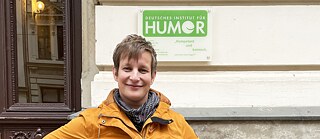The Culture of Jokes
Humor
Despite the cliché of the unfunny German, there is a rich tradition of comedy in German culture. Soraya Nelson visits comedy clubs in Berlin and interviews comedians, disproving the widespread stereotype that Germans do not know how to take a joke.
Listen to this episode: Apple Music | Spotify | Download
This Berlin-based story comes from Soraya Nelson and Dina Elsayed. Soraya is a veteran journalist and host of the podcast “Common Ground.” Previously, she acted as the program director at KCRW Berlin, where she made English-language programming for listeners in the German capital. Originally from the U.S., she spent 13 years with NPR as an international correspondent, living in Kabul, Cairo, and Berlin. Dina is a Berlin-based multimedia producer and editor. She started her journalism career in 2012 as a producer for NPR in Cairo. She currently works alongside Soraya as the senior producer of “Common Ground.” In this episode, we hear from standup comedians Carmen Chraim, Christian Schulte-Loh, and Daniel Stern. The music in this piece is “Latin” by Crowander and “Lemoncholy” by Tea K Pea. K&E Rechtsanwälte für Kultur & Entertainment gave permission to use the clip “Karl Valentin — Im Schallplattenladen” in the episode. The featured photo was taken by Soraya Nelson and shows Eva Ullmann in front of the German Institute for Humor in Leipzig, Germany.
Transcript
Soraya Sarhaddi Nelson: Let’s play a word association game: I say German, and you say humor?
[MUSIC]
Soraya Sarhaddi Nelson: I’m guessing humor is not the word that immediately came to mind. After all, many consider German comedy to be an oxymoron. A survey of 30,000 people in 15 countries done a decade ago by the social networking site Badoo actually found Germans to be the least funny nationality.
Soraya Sarhaddi Nelson: As an American who is half German and lives in Berlin, I find such assessments to be — what’s the word? Oh yeah, funny! I asked several experts for their insight, which of course, led to a joke.
Carmen Chraim: I mean, when you said that the podcast is going to be about German humor, I was like, ok, that’s going to be a short one. You know what I was going to say? I can understand that.
Soraya Sarhaddi Nelson: That’s Carmen Chraim. The Lebanese-German comedian, who lives in Berlin, believes language plays a role in why Germans are perceived as unfunny.
Carmen Chraim: I don’t know. I think maybe they have their own humor that other people don’t understand, so it could be quite dark or quite specific, especially with their language. They have like lots of specificities with the verbs and the words that they use. And that’s why maybe other people don’t understand what they mean.
Soraya Sarhaddi Nelson: Nicola McClelland agrees. She’s a professor of German at the University of Nottingham in the UK who specializes in linguistics. I apologize for the sound quality of our call, which was not the best.
Nicola McClelland: English allows loads of puns because we have no case endings, very few tense differences, and that means we have lots of flexibility where words can sound the same as each other in English, more so than in German, where you might have to put a particular ending on to show that it’s plural or that it’s dative case, or this is feminine and not masculine. It’s third person, preterite tense. All of that information is carried more explicitly, so it’s not so easy. That’s not to say that Germans don’t have any puns, they certainly do.
Soraya Sarhaddi Nelson: I asked the professor to share a few.
Nicola McClelland: Okay, so here we go. [IN GERMAN] Geht ein Cowboy zum Friseur. Kommt wieder raus, ist sein Pony weg. So, there’s a nice pun, and it’s around the word ‘Pony.’ And excuse me for my delivery, like there is a reason I’m not a standup comedian: A cowboy goes to the hairdresser’s, comes out again, and his pony is gone, right? So Pony is a pony, we all know that in English, but it also means your fringe. You know, it’s maybe not the wittiest joke out there, but it is a pun. You can do puns like that. Or: [IN GERMAN] Treffen sich zwei Kekse, da sagt der eine, komm, verkrümeln wir uns. Two biscuits meet each other. One says to the other, alright, let’s go and get crummy, which is a way of saying let’s get out of here. So, you can do those puns, but they sort of rely on the same word form having the same function in your puns. So, that is a little bit of a limit.
Soraya Sarhaddi Nelson: McClelland says there’s also a behavioral aspect to the disconnect.
Nicola McClelland: It’s really common in English that when you meet someone for the first time or if you’re giving a talk, you might sort of warm up the room by beginning with a little gentle joke. And I’m not sure that’s so typical in German. And therefore, people who start off speaking in public often start up really seriously. Or it seems to an English-speaking audience, really serious and perhaps lacking in humor because they haven’t taken that opportunity that we’re expecting in English. So, that’s kind of the unwritten behavior rules, if you like.
Soraya Sarhaddi Nelson: German comedian Christian Schulte-Loh, who splits his time between London and Berlin, says that whatever the reason for the notion of the humorless German, it has advantages too.
Christian Schulte-Loh: So, I guess we are funny, but we have a reputation for not being funny, so that can work in our favor because we can surprise people. If a German is funny on a mediocre level, they are still funnier than everybody else is expecting them to be. So, that’s good.
[MUSIC]
Soraya Sarhaddi Nelson: There’s even a German Institute for Humor. Part of its mission is to show that Germans do have a sense of humor, but founder Eva Ullmann says the fact there is humor in Germany doesn’t mean her countrymen always know what to do with it.
Eva Ullmann: We are very good in making things quite perfect and on time and be reliable. Humor, on the other hand, is sometimes not reliable. It’s a surprise, it comes from where you don’t expect it. So, I have the feeling that countries like Spain or French or countries in South America, who are little bit more relaxed with time and not on time, are sometimes better with humor.
Soraya Sarhaddi Nelson: Based in Leipzig, her academy teaches Germans across the country to employ humor in their daily lives.
Eva Ullmann: In business and in daily life or in family life, for me, humor has several advantages. It’s attracting attention, and it can de-escalate conflict. And that’s, I think, probably the most two important things, and it doesn’t matter if you’re in a business meeting or in school or if you have a conflict with your partner, with your child, or with a customer or a colleague.
Soraya Sarhaddi Nelson: One such recent training was at a multipurpose hall in the western town of Hennef, where she coached workers at the local youth welfare department. [SPEAKING IN THE BACKGROUND] In one exercise, Ullmann tells them to break off in pairs and use exaggerated gestures and words to describe their hobbies to each other and make them funny. She says, in her case, it would be swimming three hours a day, to which her partner might quip: You swim so much! You could work, make phone calls, and do your reading while you’re at it.
Eva Ullmann: [IN GERMAN] Ja, Sex, Massage ...
Soraya Sarhaddi Nelson: Ullman adds: Yeah, that and sex and a massage, too.
[LAUGHS]
Soraya Sarhaddi Nelson: Learning to be funny may be something new for many Germans, but watching comedy is something they’ve done for centuries. A lot of German humor is farcical. [MUSIC] Karl Valentin, who is sometimes called Germany’s Charlie Chaplin, brought that kind of absurdist humor to the screen in 1912. One skit he did in 1934 is called “In the Record Store.”
Karl Valentin: [IN GERMAN] Haben Sie auch neue Schallplatten?
Clerk: [IN GERMAN] Schallplatten? Natürlich.
Soraya Sarhaddi Nelson: Valentin walks into the shop and asks the clerk whether she has any new records. She asks him, what kind? He replies, round and black. Their nonsensical exchange escalates from there. But with the advent of the Third Reich, German humor largely disappeared. [MUSIC] The Nazis cracked down on anyone who dared to mock them. They arrested Jewish entertainers like Max Ehrlich, Kurt Gerron, and Dora Gerson and sent them to the Nazi death camps. Many non-Jewish German comedians refused to perform during the Hitler era in protest or out of fear. [MUSIC] There wasn’t much to laugh about in Germany after World War II either, as Germans struggled to rebuild their country and reinvent themselves. Telling a joke back then was a bit like tiptoeing through a minefield. German comedians couldn’t easily do what good comedians are supposed to do, which is deliver uncomfortable maxims that stop short of being offensive. Comedians in what later became East Germany faced additional hurdles. The German Democratic Republic banned any criticism of communism and socialism, strictly controlling literature and the arts and forbidding its citizens from consuming Western entertainment. Ullmann explains.
Eva Ullmann: In GDR times, most of the comedy programs were censored. So, there was a level everybody could laugh about, and there was a level underneath, where you really had to think about. So in my point of view, it made the humor and the comedy universe more complex. It’s never possible to forbid humor. It doesn’t matter how difficult a culture or country gets. Mostly humor finds its ways. So, also in the GDR times.
Soraya Sarhaddi Nelson: The German Institute for Humor founder says, like many East Germans, her family ignored the GDR taboos on comedy.
Eva Ullmann: I grew up in GDR times, so I remember my dad buying secretly comedians from other countries that we could listen to. So, humor in the picture and in the talk was quite important for my family.
Soraya Sarhaddi Nelson: The reunification of Germany in 1990 ended the bans, and the passage of time has eased German discomfort with jokes about their history. Ullmann says these days younger Germans are demanding a different approach to humor.
Eva Ullmann: First, we do the work, and then, we have the fun. That’s changing for now. Younger generations and younger people are expecting fun at work because they’re spending so much time at work that they at least want to, that time having fun, too.
Soraya Sarhaddi Nelson: New German trends in humor have emerged, the most significant being live standup comedy. German comedians like Schulte-Loh began crossing borders and delivering their jokes in different languages.
Christian Schulte-Loh: Here’s the best heckle I think that I will ever have heard in my entire career. I was at the Edinburgh Festival last year. I did my solo show there, and I told a joke that I would call a bit edgier, a bit darker, a bit closer to the bone. And that joke then led to the best heckle I’ve ever heard. Here’s the joke. Don’t get upset about the joke. It’s not about the joke. Okay, just promise me that. [LAUGHS] Now. But I have to tell you the joke in order for you to understand the heckle, obviously. So here’s the joke: I said that I’m becoming more and more proud of the changes our societies are going through. You know, Britain, Germany, the European Union. Germany, for example, alone because we’re becoming more multicultural, all of us. Germany, alone, last year took on more than one million refugees. You know, that’s great, isn’t it? Yeah, well, out of national guilt, obviously. [LAUGHS] Right. So one million down, five to go! That was the joke right? Now. [LAUGHS] I told you, don’t get upset about the joke. Now, now, that joke then, led to the best heckle I’ve ever heard. First, somebody shouted from the back of the room, something that you hear quite often as a comedian when you tell a joke like that. The person shouted: Too soon! What? If that’s the main problem with that joke, you know, it’s not, really there’s other things wrong with that. And then, I replied and I thought, that’s a bit childish, but I thought it was, well, at least funny, I said to, well, if it’s too soon for you, how about a dinosaur joke instead? [UNINTELLIGIBLE] And I must say he did have the better comeback. He shouted, well, you probably killed those [BLEEP] too, didn’t you? [LAUGHS]
Soraya Sarhaddi Nelson: That was from a show he did last year at the Comedy Store in London. I later asked him in Berlin whether there are still subjects that are off the table for German comedians.
Christian Schulte-Loh: So, I think there are no taboos. But at the same time, there are taboos, if that makes sense. So, it really depends on context. And like in every conversation, you know, certain things can only be said in a certain moment or in a certain tone. A difference, for example, is that in Britain, the audience expects you to be very self-deprecating first before you kind of like, you know, hit out and kind of joke about others. And I guess that is a good rule of thumb, you know, just like try to be self-deprecating first, the first joke should be on you. Not necessarily you as a person, but your culture, your country, your background, whatever. In Germany, when I started in Germany, which was 10 years after I started in English, I thought it follows the same formula. So, I’d have to be self-deprecating at the beginning of my performance, at the beginning of my set, and I did. But then, people were looking at me like: Oh, you shouldn’t, you know. Don’t put yourself down, you’re okay, you know? You know, and they had enough sympathy. And I was like, oh okay, so that’s the difference. So, Germans don’t need that. They don’t need you to be very self-deprecating before you start doing other stuff.
Soraya Sarhaddi Nelson: But are you able to do, let’s say — I mean, Nazi jokes still draw laughs overseas anyway — are you able to do that here in Germany?
Christian Schulte-Loh: Yeah, of course. Yeah, of course you have to. I mean, like, you know, Germans love a good Nazi joke, of course, and the Brits love a good — I think everybody does because obviously it’s such a big, still it throws such a big shadow over Germany that you have to joke about it, of course. But now there have been so many Nazi jokes over the last 75 years, probably over the last 30 years really, that they better be good. If you do one now, it better be good. You know, it’s the same for everything. If there is a topic that has been talked about so much, you need a better joke than if it’s a topic that nobody has joked about yet. Then, the joke can be, you know, just a mediocre joke.
Soraya Sarhaddi Nelson: How do you see German humor evolving? You talked about how things are different now that it’s a lot of standup, but I’m just wondering, if you can elaborate a bit on that.
Christian Schulte-Loh: Now, it’s more international. Every product is becoming more international because of globalization, and the same goes for comedy. And now, the younger generation, they watch English-speaking comedy on the internet, obviously, so YouTube and all the other platforms and social media, of course. Like German kids would already know who Bill Burr is or who, I don’t know, like some English comedians as well, I don’t know, Jimmy Carr or Michael McIntyre, and they will have seen those clips. So, that changes two things. One: They will have seen some very good standup before they go and watch standup live in their own language. So, their bar is set quite high, which means their expectations are high, which is then very different. And comedians won’t be able to just steal jokes from abroad because, or buy them. It used to be a time when there was no English-speaking comedy in most countries worldwide. And then, those local comedians could just buy material from America or Britain or other countries and then use it in their language, translate it and use it there. And that’s kind of over with because now people will know where the original joke came from, and that has changed a lot. So, the quality has gone up a lot because of those two factors, I think. And obviously, that’s terrible for us because we have to be even funnier, but it’s good news for the audience.
Soraya Sarhaddi Nelson: And is English humor or English-delivered comedy more successful in Germany or German comedy?
Christian Schulte-Loh: Well, I host in Germany, I host German shows and English shows, and I do both. And I feel that the German audience who comes to an English night, they’re really up for it. Really, really up for it. German audience would come to a German night are also up for it, but they’re not that hungry. It seems like there’s like an appetite for English-speaking comedy, and they’re really, really up for it. They’re fans, they’re proper comedy fans. Whilst German audiences are just audiences. They come along as they would go to the cinema or other places. It’s just more like a normal thing. But when you see those comedy nerds, you know, they would go to an English-speaking show in Germany, and you feel the difference, obviously. So it’s nice. It’s very refreshing to see people who are actually really, when you do a set up, they know the punchline. Even if it’s like a different punchline, but they come up with their own punchline, they think ahead. And that’s good. Obviously, it’s never good if the audience knows your punchline because then it’s not a very good punchline. [LAUGHS]
Soraya Sarhaddi Nelson: Berlin became a draw for many comedic newcomers as well as immigrants like American Daniel Stern who regularly does standup gigs here. [TALKING] Here is part of his recent performance at Comedy Club Kookaburra, a two decade-old venue that is a pillar of Berlin comedy and popular with Germans and foreigners.
Daniel Stern: Hey look, has anyone here tried to learn German? Do we have any expats who have tried to learn German ever?
Audience: Yeah, yeah.
Daniel Stern: Ok, yeah. You look like, is that like you’ve kind of tried or you kind of learned it or, I mean, how many times have you quit learning German, sir?
Audience: Five or six.
Daniel Stern: Five or six? You’ve been here at least five or six months, that’s great.
[LAUGHS]
Daniel Stern: How long have you been trying to learn German?
Audience: Four years.
Daniel Stern: Four years? Right? Okay, this is perfect. So, my wife is pregnant with my second child now, right? So, I’ve been trying to learn German for 11 years. In four-and-a-half years, do you know what we’ve managed to do? Grow our own translator. [LAUGHS] Yeah, Yeah. Forget about it, yeah. Raising a child in Germany is easier than learning the language. Right? And it’s, I know some of you are like: A kid, isn’t that a lot of responsibility? No, it’s not. Not at all. Right? Every Monday, ‘Kita’ opens, you know Kita? It’s state-funded daycare, right? Kita, it’s a German compound, it means like ‘Kinder, Ta-da!’ [LAUGHS] And then, you just bring your child there, and they raise it for you. It’s, oh wow ... And like, okay ... And as an American, look, all Americans are like: Oh no, but like I know what’s best for my child, and I would want to do that myself, and I wouldn’t trust a stranger. And I’m like, what? I trust in it, that’s partially because, in America, the way you become a childcare provider is you get fired from being a fry cook, and then, you’re like: This is what’s next. And to be fair, like I had great daycare teachers, like I’m not like ... Some of them were amazing. They were bad fry cooks, they [UNINTELLIGIBLE] find work. But here, I drop off my kid, and these people have like master’s degrees in early childhood education. I’m like, they know better than me. I mean, I’ve been in Germany for 11 years, and I can barely get through a sentence in that language. Like I don’t know when, and I’m not one of those expats who’s like trying to blame the German language because I don’t know it. Like I’m not, you know. I got off the plane. I was like, why is there a capital “s” in ‘street’? ‘Strabe,’ is that right? Is that right? That can’t be right. And there’s a German in the audience going: [IN GERMAN] Das ist nicht ein B. Das ist nicht ein B! I don’t know what it’s called. I used to, I used to call it the ‘ss,’ that was wrong. I know. I said, that’s like, that’s not a fun name. I gave it a fun name. I call it the waterslide. It’s like, wee, you go down that, it looks like fun, it’s not. And no, I mean, come on, I’m from America. I wouldn’t know my own alphabet if it didn’t come with a catchy jingle. But like, how good is that song? It’s like A-B-C-D — it’s a classic! What’s the best part of that song? [AUDIENCE SPEAKS] Yes, L-M-N-O-P! There’s a hundred people here, how come only one person knows that answer? It’s L-M-N-O-P! That’s the [BLEEP] guitar solo in the middle of the alphabet song! And it’s American, you know, so they’re good with marketing, so they always end it with like: Next time, won’t you sing with me? Hell yes, I’ll do that! Alright. I mean, okay, German could help me out a little, they could give me like a German alphabet song. And I don’t mean like cramming your weird alphabet into my awesome song because, guys, ‘Ypsilon’ does not fit the rhythm!
Soraya Sarhaddi Nelson: Stern and I talked about how the German capital’s comedy scene has grown during his 11 years here.
Daniel Stern: The distinction in humor in recent years was that Berlin was one of the first places where you saw DIY, grassroots English and German comedy scenes evolve where people said: Wait a second, we just need a microphone, like let’s do this. We don’t have to go through any gatekeepers. We can start a show. We can learn to do this art form, and we can share it with people, and it can expand. I moved here, there was, I think, one show a month, you know, maybe two. And then, it became a weekly show. There was a Paul Salomone, Caroline Clifford founded something called “We are not Gemüsed.” Neil Numb was producing shows back then. There was a lot of people doing this, but this scene evolved, and it’s spread from here. Really around Europe, in my opinion, certainly around Germany. And it spread from the English to the German scene as well. So, German standup now has a lot of new voices, diverse voices, some of whom started in English, even though they’re German and are now performing in German and being incredibly successful and not having to go through the route of mainstream or codified gatekeeping that existed before that was, who would book a theater? Who would get an agent? Now it’s: who’s funny, a little bit more, and that’s really important to standup that it maintains a sort of — that there should be some level of meritocracy involved at all times,. That at any given night, someone can get up there and be really funny and be rewarded for that. At least from the audience in front of them, if not for the next gig.
Soraya Sarhaddi Nelson: So, is comedy in English something that’s more, let’s say, something you would find in Berlin or Hamburg or big cities in Germany? And then, for the rest of Germany, it’s more in German? Or is there overlap?
Daniel Stern: You find English comedy in more and more cities in Germany and across Europe every day. Anyone who’s under, let’s say, 40 — and I say that as a 41-year-old — has been consuming English comedy on Netflix and YouTube. Like that’s part of the reason why you saw German comedians starting in English as they were emulating their favorite comedians who were in English. And that’s not to disrespect. It’s just, that’s what happened to happen for those performers. So yeah, that’s just spreading. Now, getting enough people to fill a room or having the confidence you can fill a room in a little town, I haven’t tried that hard to like go book a gig somewhere in a city of, I can’t even tell you the name of, but you’re gonna see it or you’re gonna see an open mic where it’s one of the ... You’ll see one comedian at a mixed open mic, and it’s gonna evolve from there. But also, I think you’ll also see more German standup as well in those little places. And that’s just fine. You know, it doesn’t have to be in English to be standup, and it’s important for German to evolve its own standup traditions, which of course, there have been German standup comedians, very successful, very popular for a long time. But there are some that are more uniquely German, I think, and sometimes, there are some that are copying sort of rhythms and patterns from other languages. And then, there’s some which are now evolving like sort of a new German comedy, which is sort of another distinct language, in my mind. I’m not a scientist.
Soraya Sarhaddi Nelson: Carmen Chraim does standup in four languages, although she’s most comfortable in English and French. I went to see her on a recent night at Space Meduza Club in Berlin.
Carmen Chraim: I’m going to be the next ‘Chancellorin’ [SIC] of Germany, our country. Yes, yes, thank you! [APPLAUSE] And that’s my vision for our country ‘Deutschland,’ which is Germany in German. For some reason, they decided to change all the letters. I don’t know why. That’s my vision. Arabs are now living here, and Arabs are gonna get to know Germans. Germans are gonna get to know Arabs. We’re going to have like eye contact, sign language, smiles, only from the Arabs. And eventually, like Arabs and Germans are going to have ‘Geschlechtsverkehr.’ You know this word? Geschlechtsverkehr. Note it down, Azerbaijan, Geschlechtsverkehr — sexual traffic, yeah? Like literally, if you come, you have to be beep beep! They’re gonna have, it’s going to be really intense, aggressive sex. Can you imagine Arabs and Germans [BLEEP]? Intense, right? We’re gonna have really awkward safewords like falafel and shit, yeah. It’s gonna be very intense. And then eventually, people are going to get pregnant, right? And then, the next generation of baby Arabic Germans are just going to be [BLEEP] handsome. That’s all that’s gonna happen! Relax! Come on. Can you imagine little Mahmoudi Schmidt all over the place here in Kreuzberg? Mahmoudi Schmidt, everybody, the future of Germany, alright? Mahmoudi Schmidt — imagine him, Laura, with me. Mahmoudi Schmidt, yeah? Brown skin, blue eyes serving you hummus in a passive-aggressive way. Oh my gosh!
[LAUGHS]
Soraya Sarhaddi Nelson: We later talked about her international audience and why English-language comedy is so popular in Berlin.
Carmen Chraim: Yeah, I mean, it was. Yeah, I mean, I guess like the audience grew a lot. I guess like in 2013, we didn’t have so many people. But then, like given that so many expats live here in Berlin and that English is one of the main languages spoken here, we got a lot of audiences. And at the moment, there are like three different clubs just dedicated for English comedy in Berlin this year, which is like a lot, yeah ...
Soraya Sarhaddi Nelson: Well, when you came, there was only one mic, basically?
Carmen Chraim: Yeah, it was one or two or something. Like where there was on Sundays, there was an open mic for all kinds of arts, and then eventually, one or another open mic started on Tuesdays. And then, yeah, things started like growing with more and more. But I think booming, it like began in 2019 when we were like able to perform like three times a night. Yeah.
Soraya Sarhaddi Nelson: So, what are the challenges for you as a Lebanese person, as an Arab person here in Berlin trying to do comedy in English, or any of the languages, that you speak? What are what are the obstacles that you see?
Carmen Chraim: Ah, ok. So as an Arab, maybe I wouldn’t say an obstacle, but I would say maybe breaking up the stereotypes that people might have about Arabic women. So, I guess when I first come on stage, like you wouldn’t say automatically: Oh, she’s Lebanese. So, I have to state it. And then directly like there are many maybe stereotypes that are in people’s heads that get broken up. So, getting them to accept me like I am and to like accept my personality and build up my persona while I’m performing is an obstacle. So, I maybe, I need more time in order for them to come closer to my bubble.
Soraya Sarhaddi Nelson: So, you think being a woman is a challenge as a comedian?
Carmen Chraim: Definitely, yeah. Definitely, yeah. I mean, mostly when I perform in open mics or in shows, I’m like one woman between five men or six men, which is not a problem. I get more opportunities as a woman because, yeah, there’s always that needs to be at least one woman in the show or something. I wouldn’t say it’s — yeah, it’s more difficult, I guess, because maybe humor started with men, so people immediately associate that to men. And maybe some people, it’s more difficult for them to find woman funny.
Soraya Sarhaddi Nelson: Chraim adds the shortage of women comedians is a global problem, not only a German one. She and the other comedians I spoke to say the future of standup comedy across Germany is bright. But what about that pervasive notion of the unfunny German? I asked Schulte-Loh whether that will ever change.
Christian Schulte-Loh: I think it’s probably our best joke that we have no sense of humor.
Soraya Sarhaddi Nelson: So, we want to keep it?
Christian Schulte-Loh: We want to keep it. It’s our USP, you know, it’s our unique selling point. Who would we be if we had a sense of humor? We would completely lose our identity, and that would be so boring and not funny at all.
[MUSIC]
Soraya Sarhaddi Nelson: I’m Soraya Sarhaddi Nelson, and thank you for listening, and I hope laughing. A big thank you also to my colleague Dina Elsayed for producing this BIG PONDER episode and our partner, the Goethe-Institut, which made all of it possible. The music was “Latin” by Crowander and “Lemoncholy” by Tea K Pea.







